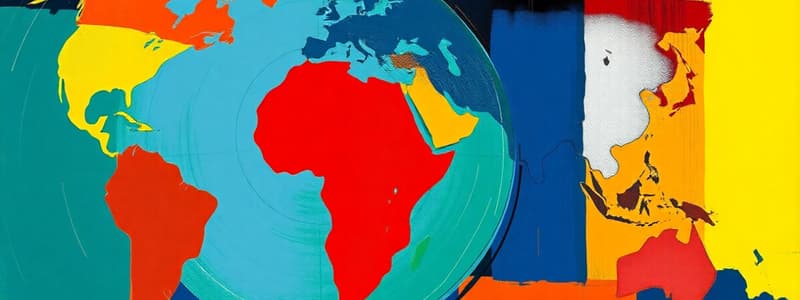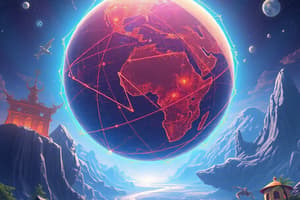Podcast
Questions and Answers
According to Anthony Giddens, what is globalization?
According to Anthony Giddens, what is globalization?
Globalization is the intensification of worldwide social relations which links distant localities in such a way that local happenings are shaped by events occurring many miles away and vice versa.
According to Roland Robertson, what does globalization as a concept refer to?
According to Roland Robertson, what does globalization as a concept refer to?
Globalization as a concept refers both to the compression of the world and the intensification of the consciousness of the world as a whole.
According to David Held, what may globalization be thought of as?
According to David Held, what may globalization be thought of as?
Globalization may be thought of as a process which embodies a transformation in the spatial organization of social relations and transactions generating transcontinental or interregional flows and networks of activity, interaction, and the exercise of power.
According to TOhmae, what does globalization mean?
According to TOhmae, what does globalization mean?
What is ethnoscape?
What is ethnoscape?
What is financescape?
What is financescape?
Which of the following is NOT a dominant view in the historical analyses of globalization?
Which of the following is NOT a dominant view in the historical analyses of globalization?
According to the Oxford dictionary stated in the text, when was the word globalization first employed?
According to the Oxford dictionary stated in the text, when was the word globalization first employed?
When did globalization enter the Merriam-Webster dictionary?
When did globalization enter the Merriam-Webster dictionary?
When did the noun 'globalization' appear in the Oxford English dictionary?
When did the noun 'globalization' appear in the Oxford English dictionary?
When was the notion of the world transforming into a global village introduced by Marshall McLuhan?
When was the notion of the world transforming into a global village introduced by Marshall McLuhan?
The concept of McDonaldization theory is defined as “the process whereby the principles of the fast-food restaurant are coming to dominate more and more sectors of American society and the world.
The concept of McDonaldization theory is defined as “the process whereby the principles of the fast-food restaurant are coming to dominate more and more sectors of American society and the world.
What does Roland Robertson's concept of glocalization suggest?
What does Roland Robertson's concept of glocalization suggest?
In the context of glocalization, what does the term 'glocalization' mean?
In the context of glocalization, what does the term 'glocalization' mean?
Match each of the following landscapes/dimensions of cultural flow, based on Arjun Appadurai's work, with their correct description:
Match each of the following landscapes/dimensions of cultural flow, based on Arjun Appadurai's work, with their correct description:
Flashcards
Globalization (Anthony Giddens)
Globalization (Anthony Giddens)
The intensification of worldwide social relations linking distant localities.
Globalization (Roland Robertson)
Globalization (Roland Robertson)
The compression of the world and the intensification of the consciousness of the world as a whole.
Globalization (David Held)
Globalization (David Held)
Process embodying a transformation in the spatial organization of social relations and transactions.
Globalization (TOhmae)
Globalization (TOhmae)
Signup and view all the flashcards
Ethnoscape
Ethnoscape
Signup and view all the flashcards
Technoscape
Technoscape
Signup and view all the flashcards
Ideoscape
Ideoscape
Signup and view all the flashcards
Financescape
Financescape
Signup and view all the flashcards
Mediascape
Mediascape
Signup and view all the flashcards
Skeptical Approach to Globalization
Skeptical Approach to Globalization
Signup and view all the flashcards
Hyperglobalist Approach to Globalization
Hyperglobalist Approach to Globalization
Signup and view all the flashcards
Time-Space Distanciation
Time-Space Distanciation
Signup and view all the flashcards
Global Risk Society
Global Risk Society
Signup and view all the flashcards
Homogenization
Homogenization
Signup and view all the flashcards
McDonaldization
McDonaldization
Signup and view all the flashcards
Study Notes
- Globalization is examined as a process, condition, and ideology
- Explores academic perspectives from political scientists, economists and communication experts
Concepts of Globalization
- Students learn to distinguish definitions
- Students learn to adopt a working definition
What is Globalization?
- Globalization intensifies worldwide social relations, linking distant areas
- Local events are shaped by occurrences far away and vice versa, according to Anthony Giddens
- Roland Robertson defines globalization as how the world compresses and intensifies awareness
- David Held considers globalization a process that transforms spatial organization and transactions
- Generating transcontinental or interregional flows and networks
- TOhmae: Globalization is the onset of the borderless world
The 5 "Scapes" of Globalization
- Globalization entails increasing interconnections across the globe, explained by Arjun Appadurai's five "scapes" or flows
- Ethnoscapes refer to the flow of people across boundaries, including labor migrants, refugees, and leisure travelers
- Technoscapes describe the flows of technology, like Apple's iPhone
- Ideoscapes refer to the flow of ideas, ranging from personal views on Facebook to the spread of religious doctrines
- Financescapes refer to the flow of money across political borders
- Mediascapes refer to the flow of media across borders
- Brazilian telenovelas being shown on African bus trips are an example of mediascapes
- Appadurai's scapes provide tools for understanding circulation but can be misleading, as phenomena often involve multiple scapes
Development of Globalization
- The term "globalization" appeared in the Oxford dictionary in the 1930s
- It Entered the Merriam-Webster dictionary in 1951
- The noun form appeared in the Oxford English dictionary in 1962
- Marshall McLuhan introduced the "global village" concept in 1960
- Social scientists and economists widely adopted it in the 1960s
- Globalization developed as a paradigm in social sciences in 1992
Perspectives on Globalization
- Skeptical approach: Internationalization isn't new; developments only change the scale of globalization
- Hyperglobalist approach: Identifies a historical break-point where contemporary globalization emerged
- Transformationalist thesis: Argues for unprecedented global interconnectedness
- Hyperglobalists believe we are in a global age with global capitalism and declining national governments
- Skeptics see trading blocs weaker than in earlier periods with reinforced national governments
- Transformationalists describe historically unprecedented levels of global interconnectedness and restructured governments
Five Waves of Globalization
- First wave: Occurred for over 5000 years through trade, migration, and conquest
- Second wave: Associated with Western European conquest of Asia, Latin America, and Africa and the spread of capitalism
- Third wave: Started around 1870, declined around 1914, and was characterized by technological advancements, global production, and mass migration
- Fourth wave: From 1945-1980, spurred by retreat of nationalism, strengthening of internationalism, led by the United States
- Fifth wave: The current period and is characterized by unprecedented interdependence and growth of powerful actors
World-System Theory
- Dominant theory in the 1950s was modernization theory
- Wallerstein argues globalization represents the triumph of a capitalist world economy with global division of labour
- A world-system is a "multicultural territorial division of labor" where trade of commodities is necessary
Division of the World
- Core: Powerful, developed centers like Western Europe, North America, and Japan
- Periphery: Regions forcibly subordinated by the core through colonialism, including Latin America, Africa, Asia, the Middle East, and Eastern Europe
- Semi-periphery: States previously in the core moving down or previously in the periphery moving up
Theories of Global Capitalism
- The Transnational Practices (TNP) by Leslie Sklair: Rejects state-centrism and globalism, supports a global system and involves the transnational capitalist class (TCC)
- Emergent Transnational State (TNS) apparatus by William Robinson analyzes the rise of a Transnational Capitalist Class (TCC)
- Network society: Society's structure is networks powered by microelectronics, information, and communication technologies
Key aspects of the Network Society
- Informational and knowledge-based
- Globally organized in production
- Networked, productivity through global interactions
Time-Space Distanciation
- Time-space distanciation is the intensification of worldwide social relations, according to Anthony Giddens
- Social relations are lifted out from interactions and restructured across time and space
Global Risk Society
- Globalization has led to the creation of a "global risk society.” Human activities cause risks like pollution, crime.
Globalization and Culture
- Homogenization: Globalization causes the consumption of one culture by another
- Hybridization: Mixing cultural forms, genres, or styles occur
- Heterogeneity: Continued cultural difference with local autonomy happen
The Global Village
- McLuhan used that phrase to highlight that an electronic nervous system rapidly integrating the planet
- Events globally can be experienced instantly similar to life in small villages
McDonaldization
- Process where principles of fast-food restaurants come to dominate sectors of society and the world
- Efficiency: Completing tasks is a rational determination of the best mode of production
- Calculability: Assessment of outcomes based on quantifiable (quantity over quality)
- Predictability: The production process ensures uniformity of product and standardized outcomes
- Control: Substituting human labor for non-human labor
Glocalization
- Roland Robertson's concept that the global is only manifest in the local
- GLOCALIZATION has lead to ideas about home, locality and community has been extensively spread and globalized
Landscapes or Dimensions of Cultural Flows
- Mediascapes: Flows of image and communication
- Ethnoscapes: Flows of individuals around the world
- Ideoscapes: Exchanges of ideas and ideologies
- Technoscapes: Flows of technology and skills to build linkages
- Financescapes: Interactions with money and capital
- Appadurai's suffix "scape" signifies processes with fluid, irregular shapes
Studying That Suits You
Use AI to generate personalized quizzes and flashcards to suit your learning preferences.



